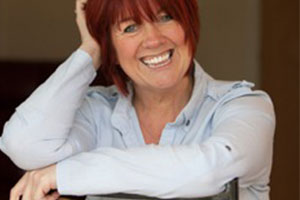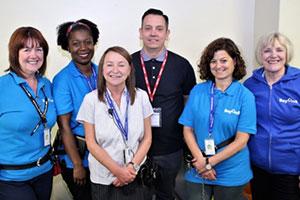Jacqueline Hollows, the founder of Beyond Recovery CIC, discusses with The Custodial Review why she set up a social enterprise dedicated to helping prisoners realise their true potential…
Mental health and addiction Q&A
When was Beyond Recovery set up, and what was the driving force behind it?
Beyond Recovery was created as a social enterprise in February 2015 after I had a defining moment of realisation where I saw that the way addiction and mental health are treated and viewed need to be radically changed. Having undergone some personal life changes, I gave up my career in IT and project management to work full time on my passion for helping people who had been trapped in a cycle of criminal justice, addiction and poverty. Having realised that all human beings have a core of health and wellbeing, I saw how this could impact on some of societies biggest problems. This led to working with people in custody as well as those in  community.
community.
How has Beyond Recovery grown since it was set up?
After working for a couple of years voluntarily in the recovery sector, we were fortunate to make contact with Scott Davidson of Phoenix Futures and partnered with him and NCC to run a 12-month pilot at HMP Onley. This involved running group workshops for the inmates of Onley and running training programmes for the Phoenix Futures team. We were commissioned to evidence the impact of our work through an academic research study and case studies. In addition we started working at HMP Rye Hill with the same basis.
Three years on we are still working with the men at HMP Onley: we have had two papers published in the International Journal of Offender Behaviour and Comparative Criminology; we have run 30 programmes impacting over 300 men; we have developed an apprenticeship programme for peer mentors and have started an Academy for supporting the men when they are released from prison. In addition, I have been invited to talk about the groundbreaking work at events around the world.
Can you give a specific example of a success story?
Alfie came from a Romany gypsy background, and although he was brought up in a single-parent family, he says he had a ‘good’ upbringing and his mum worked hard to support the family. He became involved in snooker and after seeing cocaine being used he dabbled in drugs and married at 17. He soon had children but found out his wife had had an affair, which turned his world inside out.
Drugs helped initially as he felt comforted. Before long Alfie was in prison on a driving charge and was introduced to heroin. His life was one long round of drugs, crime and prison. He was never out of prison for more than six months at a time. At HMP Onley he was in a very low place and even though he realised the heroin wasn't helping it was the only thing he knew to help him cope.
One day he noticed Jacqueline gathering men to start a group and as soon as he heard the word 'recovery' he signed up and started attending the groups. Alfie said: “I thought they were hippies at first, talking about love, but something inside me told me to stick at it! They were always smiling! I knew I wanted some of that!" “One day we were off the wing and my brother was on another course which got cancelled, so he asked to joined our course.”
Alfie had his first big realisation during the group, noticing that his brother (his codefendant on the current crime), and he viewed their crime in very different ways – Alfie was anxious and stressed whereas his brother had been excited – Alfie realised we all live in 'separate realities created by our own thoughts'. He added: “I was brought up to respect my elders and follow my older brother.”
Soon after he had another big insight, realising that he could say no to his brother, and make his own decisions. Alfie became even more in control of his future. He said: “Twenty years of saying ‘yes’ to him, and all I had to do was say no. Doors started opening for me, I stopped drugs. I got offered a job at a drug support team in Onley and I felt really good about life.
"Things were going well – but then I got accused of doing something I didn’t do. I lost my Category D and was moved off the enhanced wing. I went back to the only thing I had known – drugs, but the big surprise was that drugs didn’t give me a relief! Fortunately they did give me an insight into the cycle of addiction but I realised relief, like happiness and love, can only come from inside our own mind.”
Alfie eventually got his Category D granted and whilst on ROTL he was working at a charitable organisation supporting drug addicts and homeless people. As a graduated of Beyond Recovery's Apprenticeship programme he was invited to give a talk at a conference in front of 1,000 people in May 2018 about how different his life is since realising his own potential comes from within not from anything outside of him. See the video here:
https://vimeo.com/274683084/38e57c02d6
Who are your volunteers, and what background/skills do they have?
We have volunteers from within the 3P community (Three Principles is the philosophy we teach) who are interested in the work and want experience – they usually have professional backgrounds and qualifications.
My vision is to grow Beyond Recovery in scale and impact through the peer mentors. We nurture them while they are still in custody and then continue to support and mentor them on release. I see the Academy as a way of building confidence and a fertile ground for ideas that can change society. Our peer mentors will be at the forefront of this: creating solutions, delivering solutions and being advocates of change. They will start as volunteers and hopefully move into employed roles or start their own social enterprises.
What would you like to see change in terms of public policy, to ensure ex-prisoners are effectively rehabilitated?
I’d like to see way more focus on the rehabilitation side. I see that there are a lot of good people doing a lot of good work but that we are just treating the symptoms. Something more fundamental has to be done – this involves attitudes and wellbeing, it involves having people help themselves and see hope and opportunity. We have to create opportunity ourselves and the only way we can do that is through understanding that it all starts with us. Prison have a dichotomous role – punishment and rehabilitation – I don't think the two are natural companions. So the punishment part needs to be undergone with humanity but the rehabilitation part needs a radical rethink.
For more information on Beyond Recovery, see beyond-recovery.co.uk.

 community.
community. 

